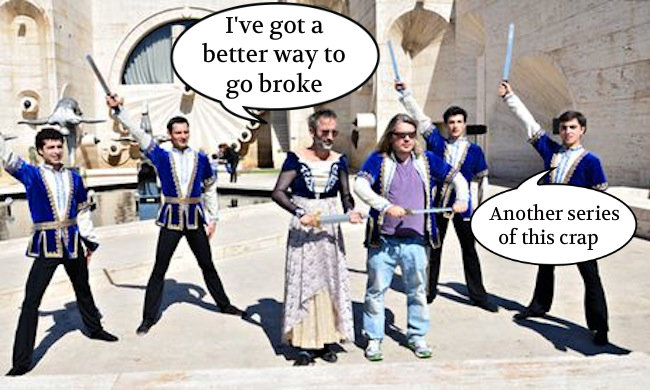Mic Wright’s Remotely Furious: Coming Soon – Comedians Throwing Cash At Kids In The Congo
Mic Wright’s Remotely Furious: Coming Soon – Comedians Throwing Cash At Kids In The Congo
24 Hours to Go Broke could easily have been retitled Ha! Poor People and executive produced by the Bullingdon Club. One of the infrequent forays into original programming by Dave, home to the EU
Top Gear repeat stockpile, the premise is two comedians are sent to a foreign country to blow a pile of loot. The joke? That living costs in the locale are so low that they struggle to get shot of the £10k before the deadline and a poorly-defined forfeit.
Episode one saw David Baddiel and Richard Herring dropped in Yerevan, the capital of Armenia. The country sits uncomfortably at 116th in the world wealth index. Baddiel rationalised the tasteless premise by concluding that any travel show is just as bad: “Really, all TV shows that send anyone anywhere are doing exactly the same thing.” Still, he looked very uncomfortable throughout, particularly under the disapproving gaze of the room service waiter dispatched to bring champagne to the hotel’s presidential suite.
Dashing around the oddly deserted city, the pair managed to drop £595 on the lunch, pay a Baddiel-lookalike for a picture and get told off by a fortune teller for not believing in her predictions. It made for queasy viewing. Neither of the comedians meant any harm but the underlying point was that we have money and the Armenians don’t. The programme taught viewers little and offered sparse spread of laughs for all that effort. Where will the premise end? Mock The Week panelists throwing wads of cash at amputees in the Congo?
Mr Drew’s School For Boys was more up-lifting though often just as an uneasy a watch. Nearing the end of his experimental summer school designed to help 11 troubled boys, the head still found himself dealing with “lazy swearing” and energetic brawls. Of course the football match scheduled for the end of the episode was going to turn out alright, the narrative structure of television documentaries demanded it, but as the boys took to the field, even the most jaded viewer must still have had doubts.
Watching the boys’ sportsman-like conduct during and after their three-nil drubbing was cheering. With their often troublesome parents cheering them on and the spivvy Mr Volante as example and manager, the defeat was nothing of the sort for the boys. They had, however temporarily, triumphed over their personal problems and their issues with their teammates.
As with any of these education-focused documentaries, it’s hard to shake off the thought that the mere presence of the cameras may be making things worse. Does the presence of the camera make playing up more likely? But Drew and his team do seem to have helped the children and their parents. Ideally, they wouldn’t have to have their redemption played out over a four-week TV series but a lot of things are far from ideal. Perhaps other parents struggling with “problem children” will see that things can change. It’s probably too much to hope Michael Gove tuned in. He’d prefer 24 Hours to Go Broke.
Posted: 14th, May 2014 | In: Key Posts, TV & Radio Comment | TrackBack | Permalink



